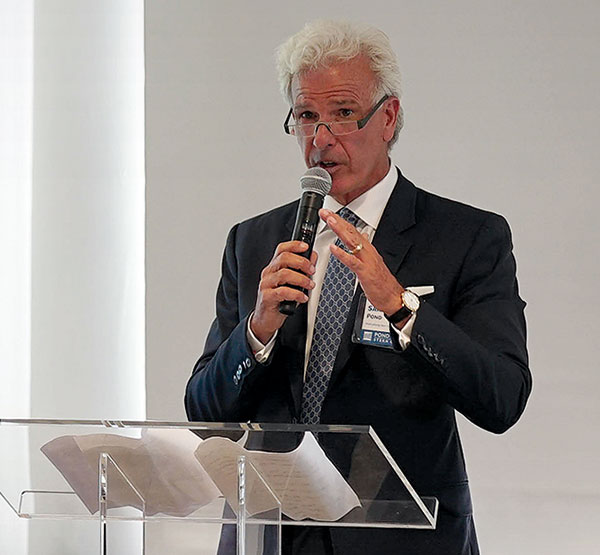
Sam Pond
Sam Pond, a member of USC Shoah Foundation’s Next Generation Council, has been a firm advocate for the Institute since being introduced to its work almost 15 years ago. “I’m not Jewish, but I hate hatred, and dislike ignorance,” Pond said, discussing his draw to the Institute’s work. “People don’t really understand how insidious antisemitism is. It’s growing worldwide, especially in the West.”
Pond shared his passion for the Institute’s work at a June fundraising event for the Countering Antisemitism Through Testimony (CATT) program. Because of a recent surge of antisemitism, the message and mission of the CATT initiative are more vital than ever, as targeted outreach and the use of testimony from those who have suffered from contemporary acts of antisemitism can help audiences learn the impact of hatred and develop methods to fight this threat.
Attendees at Pond Lehocky Stern Giordano, Pond’s law offices in Philadelphia, listened to a panel including USC Shoah Foundation Next Generation Council Member Dr. Qanta Ahmed, Board of Councilors Vice Chair Joel Citron, and USC Shoah Foundation Finci-Viterbi Executive Director Stephen Smith as they discussed the current state of antisemitism in the United States and across the globe and addressed the power of testimony, such as that provided through the Institute’s Visual History Archive (VHA), to enact widespread change. Pond has held other events in the past, to raise both funds and awareness about the Institute and its work. “USC Shoah Foundation serves as a bulwark, a stopgap, protecting against the erosion caused by genocide and antisemitism,” Pond explained. “We are finding out how to do more than just react to these events after they happen, and instead prevent them from happening in the first place.”
Pond, who has also sponsored public service announcements on Comcast channels to raise awareness about the Institute, emphasized the point that genocide may always be in hibernation, but that hope and resilience, such as that exemplified by survivors within the VHA, are among the most effective means to combat it.
Concluding the evening’s events, Pond asked each audience member to spread word about the Institute’s work to at least one other person, as one story, one conversation, can be enough to change a mind. “We try to get ten people to tell a hundred to tell a thousand. We have no other choice but to take on this responsibility as citizens of the world.”